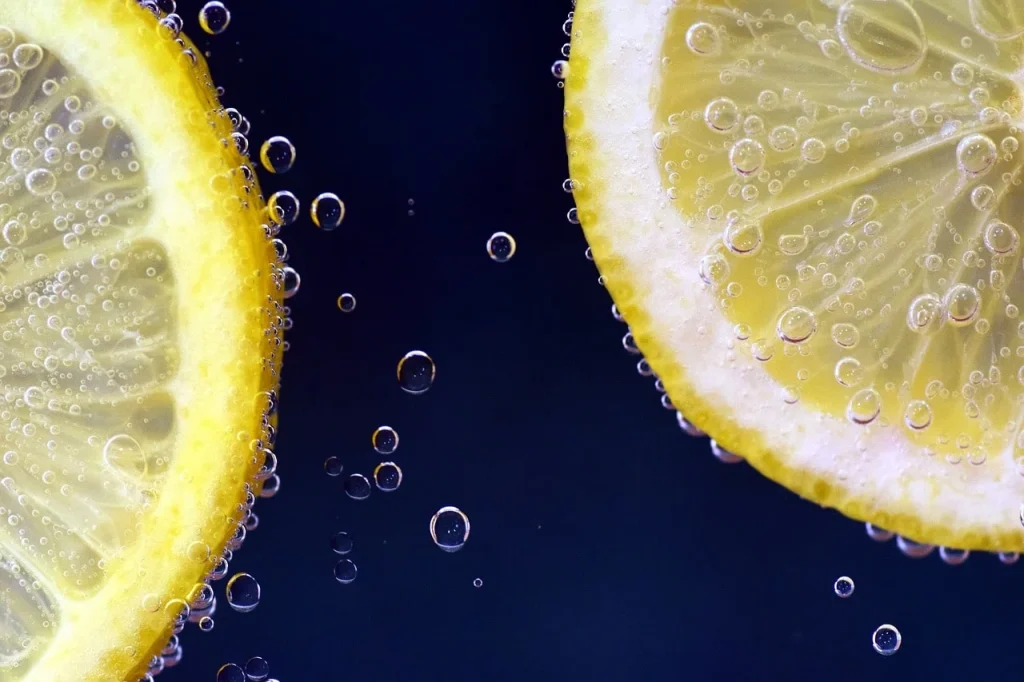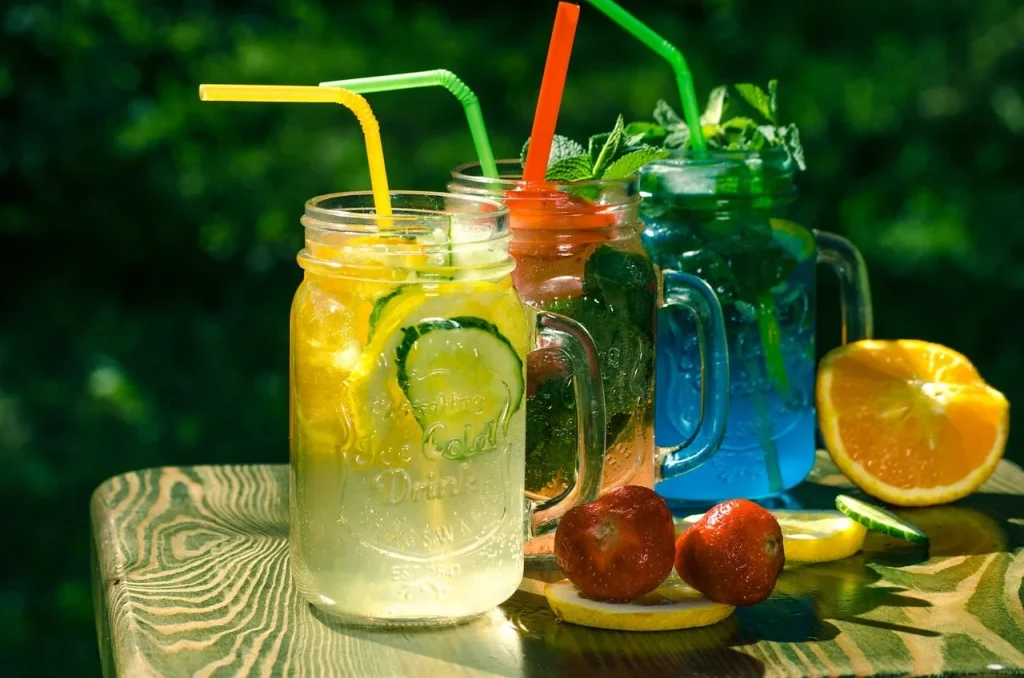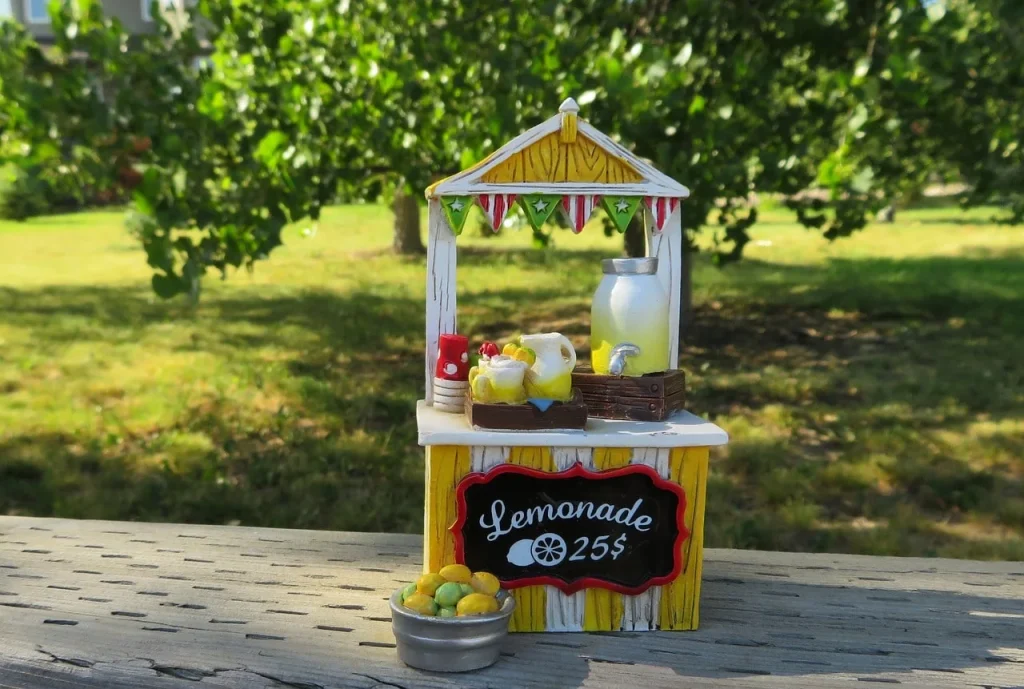Lemonade, the classic summer drink that’s loved by everyone from toddlers to grandmas, has a lot more going on than just water, lemons, and sugar. This thirst-quenching beverage has been cooling us down on hot days, spicing up our picnics, and even making our lemonade the talk of the neighborhood.
Did you know that there are about as many facts about lemonade as there are lemons in a large grocery store? That’s a lot! From its humble beginnings to the secret behind its tangy taste, we’re diving into some fun facts about lemonade that might just surprise you.
When life gives you lemons, make lemonade.
Elbert Hubbard
Lemonade Facts
Let’s start our journey into the refreshing world of lemonade. Read carefully because you have to put your knowledge to the test in the quiz that I created at the end of this article.
- The first documented recipe dates back to the 10th century in Egypt.
- Pink variations get their color from added fruit juices, not just lemons.
- A classic recipe from the Renaissance era was used as a restorative drink.
- Honey was the sweetener of choice before sugar became widely available.
- Victorian-era etiquette books recommended it as a refreshing drink for ladies.
- The annual festival in Menton, France, celebrates the lemon in all its forms, including this iconic drink.
- It was sold for the first time in Paris in 1630 by a company owned by Sicilian lemon growers.
- A popular variant involves adding a splash of lavender for a floral twist.
- The world’s largest glass was filled in Israel in 2013, containing over 11,000 liters.
- According to food historians, medieval street vendors in Paris sold it as a cooling drink.
- In traditional medicine, it’s considered a remedy for sore throats and digestive issues.
- Some bartenders use egg whites to create a frothy top.
- The concept of a lemonade stand as a child’s first business originated in 19th-century America.

- In Australia, the term often refers to a clear, carbonated soda, not the fruit-based drink.
- A 17th-century French company marketed a blend of sparkling water and lemon juice as a healthful beverage.
- During the California Gold Rush, it was a popular temperance drink.
- Barley lemonade, a mix of lemon juice, water, and barley water, was a popular variation in the UK.
- In East Asian traditions, a preserved version is made for cold relief.
- Some variations are made with mint for a refreshing twist.
- Ancient Egyptian texts mention a lemon juice and beer concoction for festive occasions.
- It can be turned into sorbet for a frozen treat.
- In the 18th century, British sailors drank it to prevent scurvy, not knowing vitamin C was the beneficial component.
- A version with charcoal became trendy as a detox drink in the 21st century.
- The first bottled version was sold in 1879 in Massachusetts.
- Some chefs use it as a base for marinades and sauces, adding a tangy flavor to dishes.
- In Turkey, a traditional version is made with mulberry syrup.
- Non-traditional ingredients, like basil or rosemary, are used for artisanal versions.
- It’s often included in detox water recipes for its cleansing properties.

- During Prohibition in the United States, it became increasingly popular as an alcohol-free alternative.
- Some people add a pinch of salt to enhance the flavor.
- The world record for the fastest time to drink a liter was set in 2015, at just under 17 seconds.
- In India, a spiced version called Nimbu Pani includes cumin and ginger.
- French impressionist painters often depicted Parisian café life, including patrons sipping on this beverage.
- The term “lemonade braids” refers to a style of braided hairstyle inspired by Beyoncé, not the drink itself.
- A 19th-century advertisement claimed it could cure cholera.
- Carbonated versions were developed in the 1830s as an alternative to alcoholic beverages.
- A traditional Russian recipe adds raisins for a slight sweetness.
- It’s a key ingredient in the Arnold Palmer, a half-and-half mix with iced tea.

- Ice cubes made from it can add a flavorful boost to water or iced tea.
- The phrase “When life gives you lemons, make lemonade” is often cited as a philosophy for optimism.
- Experimental chefs have created a frozen foam version using liquid nitrogen.
- A medieval version was made with quince and honey.
- It’s used in some cultures as a natural hair lightener during the summer.
- Science experiments for kids often include using its acid to power a lightbulb.
- In 17th century England, a patent was granted for the manufacture of sparkling lemonade.
- Flavored versions can include exotic ingredients like dragon fruit or kaffir lime.
- The first vending machine, reported in the 17th century, served lemonade in London.
- A green variation uses lime juice instead of lemon for a tart flavor.
- Its acidity can clean and disinfect household surfaces naturally.
- In culinary competitions, chefs have infused it into gelatin spheres for modernist cuisine presentations.
Lemonade Myths

As we continue our journey, it’s time to distinguish fact from fiction. In the next section, we’ll explore common myths and reveal the truth behind them.
- Lemonade is Best Served Ice Cold
While often served chilled, its flavor can be enhanced at a slightly cooler temperature than room temperature. The balance of sweetness and tartness is more pronounced, allowing the palate to detect its nuanced flavors more effectively. - Only Fresh Lemons Make Good Lemonade
Fresh lemons are preferred for their flavor, but lemonade made from concentrated lemon juice can still be delightful. Through careful preparation, a refreshing and enjoyable lemonade is often achieved, even when fresh lemons are not available. - Lemonade Is Just for Summer
It’s refreshing quality is enjoyed year-round, with variations like hot lemonade during the colder months. Served warm, it is known to provide comfort, showcasing lemonade’s versatility beyond the summer season. - Lemonade Cannot Be Healthy
When prepared with a mindful approach to sugar content, it can be a healthier beverage choice. Substituting traditional sweeteners with alternatives like honey or agave can reduce sugar levels, making lemonade a more health-conscious option. - All Lemonades Taste the Same
The taste of lemonade greatly varies depending on the type of lemons used, the sweeteners, and additional flavors (such as herbs or fruits). This diversity offers a broad spectrum of flavor profiles, making each lemonade recipe uniquely delightful.
No products found.
Lemonade Quotes

Let’s raise a glass (of lemonade, of course) to these delightful quotes that capture the essence of this beloved beverage.
If life gives you lemons, don’t settle for simply making lemonade – make a glorious scene at a lemonade stand.
Elizabeth Gilbert
Elizabeth Gilbert urges us to not just cope with adversity but to use it as an opportunity to stand out and shine brilliantly.
A life without challenge would be like going to school without lessons to learn. Challenges come not to depress or get you down, but to master and to grow and to unfold your abilities.
Jon M. Huntsman, Sr.
Jon M. Huntsman, Sr. compares life’s challenges, including those metaphorically similar to making lemonade from lemons, as essential for personal growth and mastery.
Lemonade is for kids who don’t know how to make a martini.
Fran Lebowitz
Fran Lebowitz brings her characteristic wit to the table, suggesting that making lemonade from life’s lemons might be child’s play compared to more sophisticated endeavors.
Turning lemons into lemonade is a desirable quality for any leader.
Reed Markham
Reed Markham highlights the importance of transformational leadership, emphasizing the ability to navigate through challenges positively.
The best kind of sunshine is when you make it shine yourself.
Anonymous
This quote embodies the essence of self-determination and positivity, akin to making your own lemonade when faced with the sourness of life’s lemons.
Lemonade FAQ

As we squeeze the last drops from our exploration, we transition to the FAQ section. This is your final sip before the quiz, so pay close attention.
- Will lemonade help you lose weight?
Yes, and no. It can be a refreshing, low-calorie drink if made with little to no sugar, which might help you manage your calorie intake better. However, traditional lemonade recipes high in sugar won’t directly contribute to weight loss and might actually do the opposite. - Can lemonade cause diarrhea?
It’s possible, especially if you consume a lot of it. The high acidity of the lemon juice can irritate your digestive system, and if your lemonade is sweetened with sugar substitutes like sorbitol, these are known to cause diarrhea in some people. - Will lemonade help with constipation?
It might help to some extent. The water content can aid hydration, which is beneficial for preventing constipation, and the lemon can stimulate digestive juices. However, it’s not a guaranteed or direct cure for constipation. - Can lemonade go bad?
Yes, it can go bad. Fresh homemade lemonade lacks the preservatives found in store-bought varieties and should be consumed within a week when stored in the refrigerator. Look out for signs of spoilage like off-smell, mold, or a change in taste. - Will lemonade raise blood sugar?
Yes, lemonade, especially the commercially produced or homemade kind with a lot of added sugar, can raise your blood sugar levels. Opting for lemonade made with little to no added sugars or a sugar substitute can mitigate this effect.
No products found.
Lemonade Trivia

Welcome to our sizzling lemonade quiz! Fail to squeeze a right answer, and you might just find your next glass of lemonade mysteriously turning into pickle juice.
Lemonade Merch
If you are a true lemonade fan, then you definitely need to check out our lemonaid merchandise. You can find T-shirts, hoodies, mugs, and tote bags for your favorite designs. Feel free to check out all the other designs in our shop.
Conclusion
Wrapping this up, we’ve squeezed out all there is to know about lemonade, from its health benefits to its rich history. It’s amazing to think how this lemony concoction has stayed popular through the ages, proving that sometimes the best things in life are the simplest.
So next time you’re sipping on this zesty beverage, remember its sunny origins and all the joy it brings. Before we part, here’s a funny question: If you had to compete in a lemonade-making contest, what secret ingredient would you add to win? Let me know in the comments.


